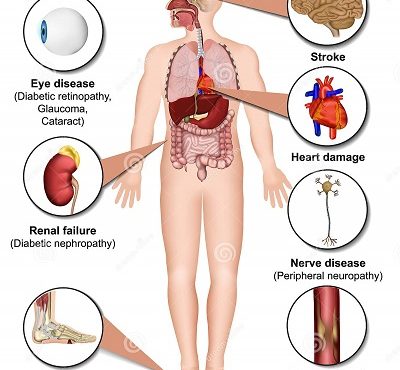Diabetes and speaking in “tongues”

I have on several occasions had the unpleasant duty of telling family, friends and clients about a medical condition that they may be challenged with; heart disease, stroke, HIV, COVID-19, cancer etc. but none of them seem to have the same impact as DIABETES. Many people who have never seen the inside of a church building will break out into uncontrollable “tongues” that will amaze even the Apostles at Pentecost. That is how much diabetes is feared and it can cause havoc if not managed properly.
Diabetes on its own will not kill even if it wipes your bank account dry BUT the organ complications that come with poor management or no management is the killer. That is why the theme for World Diabetes Day (November 14) from 2021 to 2023 is ACCESS TO DIABETES CARE. Insulin which is the mainstay of diabetes and its management was discovered a century ago yet millions of people with diabetes around the world cannot access the care they need.
NO “SUGAR-COATED” STATISTICS
463 million adults have diabetes worldwide
To put in perspective, if people with diagnosed Diabetes were a country on its own, their population will be more than that of the USA.
THE International Diabetes Federation (IDF) predicts that 700 million people worldwide will have diabetes by 2045. Well, unless we all do something drastic.
Diabetes complications caused 4.2 million deaths worldwide in 2019.
Adults with diabetes have a two to three-fold increased risk of heart attacks and strokes (WHO, 2020).
85 per cent of the world’s foot amputations are a result of a diabetic foot ulcer. (The American Journal of Managed Care, 2018).
African-Americans are four times more likely than whites to have a diabetes-related amputation. (The American Journal of Managed Care, 2018).
Diabetes Retinopathy (long-term damage to retinal blood vessels) causes 2.6 per cent of vision loss worldwide. (WHO, 2020).
TELL-TALE SIGNS of DIABETES
The majority (90 per cent to 95 per cent) of people with diabetes have Type 2 diabetes and this starts slowly and we may often ignore the warning signs.
If we can test for COVID-19 for FREE and vaccinate for FREE, I dare say we owe it a duty to test every person over the age of 18 years for diabetes. Let us not wait. We have to stop the march towards 700 million people.
Be wary of these and see your healthcare professional immediately:
Increased appetite or unexplained weight loss
Slow-healing cuts
Frequent yeast infections (including “whites”)
Pain or numbness in extremities
Vision changes
Fruity or sweet-smelling breath
Fatigue or weakness
Dry mouth or dry skin
Extreme thirst
Frequent urination
TO-DO LIST STARTS TODAY
We cannot avoid certain risk factors such as age, people in our family with diabetes (family history) BUT we can modify some factors that will prevent or prolong the onset of prediabetes, Type 2 diabetes and complications of diabetes. Many of these require individual effort and that essentially means the power is in our hands to a large extent.
Today I will start the following and keep at it and I pray you do the same too;
Maintaining a healthy weight
The body loves moderation. Being underweight or overweight is a risk for several diseases including diabetes.
Losing 5 per cent to 7 per cent of body weight and exercising at least 150 minutes a week in addition decreased the risk of developing Type 2 diabetes in a study group by up to 58 per cent.
Eating a healthy diet and in the appropriate quantity
We definitely are what we eat…Haven’t we all had enough sugar? Can we start by cutting out sugar and reducing our portions of refined carbohydrates such as white bread and white rice?
Persistent physical activity or exercising at least five (5) days a week.
Yes by all means walk, ride a bike, swim and engage in interval training but also ensure you do “resistance exercises (using free weights, resistance bands, weight machines etc.) increased strength in adults with Type 2 diabetes by 50 per cent and improved glycated haemoglobin by 0.57 per cent.” (Diabetes Care, 2016). Glycated haemoglobin is a measure of our long-term control of blood sugar.
Managing Stress
Stress affects every part of our body and health. In addition to flooding our bodies with cortisol that will lead the charge to lay down fat in our midsection, it also affects our eating pattern, sleep duration and quality, drinking habits and exercise schedules. Unfortunately it does all these in the negative way.
Checking blood sugar
We surely need to check our blood sugar with or without symptoms of diabetes
Do not be stuck on just fasting blood sugar but sometimes insist on random blood sugar when you take a sample two hours after a meal for instance or even get a glycated haemoglobin test as well. Oh and there is no harm in checking your urine as well.
Diabetes is a PANDEMIC too and we need to take it more seriously. The cost to individuals, families and countries when people have diabetes and especially those with complications has always been underestimated. Very often we overlook the social, mental, physical/productivity aspects and focus only on the financials and even that has totally gone through the roof and is targeting space. I hope we can all do our bit to reach especially those who cannot afford to test and adopt the appropriate lifestyle. May the powers that be listen and act.
AS ALWAYS LAUGH OFTEN, ENSURE HYGIENE, WALK AND PRAY EVERYDAY AND REMEMBER IT’S A PRICELESS GIFT TO KNOW YOUR NUMBERS (blood sugar, blood pressure, blood cholesterol, BMI)
Dr. Kojo Cobba Essel
Health Essentials Ltd/ Mobissel Ltd
Dr. Essel is a medical doctor, holds an MBA and is ISSA certified in exercise therapy, fitness nutrition and corrective exercise.
Thought for the week –“In 2012 about 56 million people died throughout the world; 620,000 of them died due to human violence (war killed 120,000 people, and crime killed another 500,000).
In contrast, 800,000 committed suicide, and 1.5 million died of diabetes. Sugar is now more dangerous thangunpowder.”
― Yuval Noah Harari, Homo Deus: A History of Tomorrow
References:
International Diabetes Federation (IDF)
World Health Organisation (WHO)
By Dr. Kojo Cobba Essel














